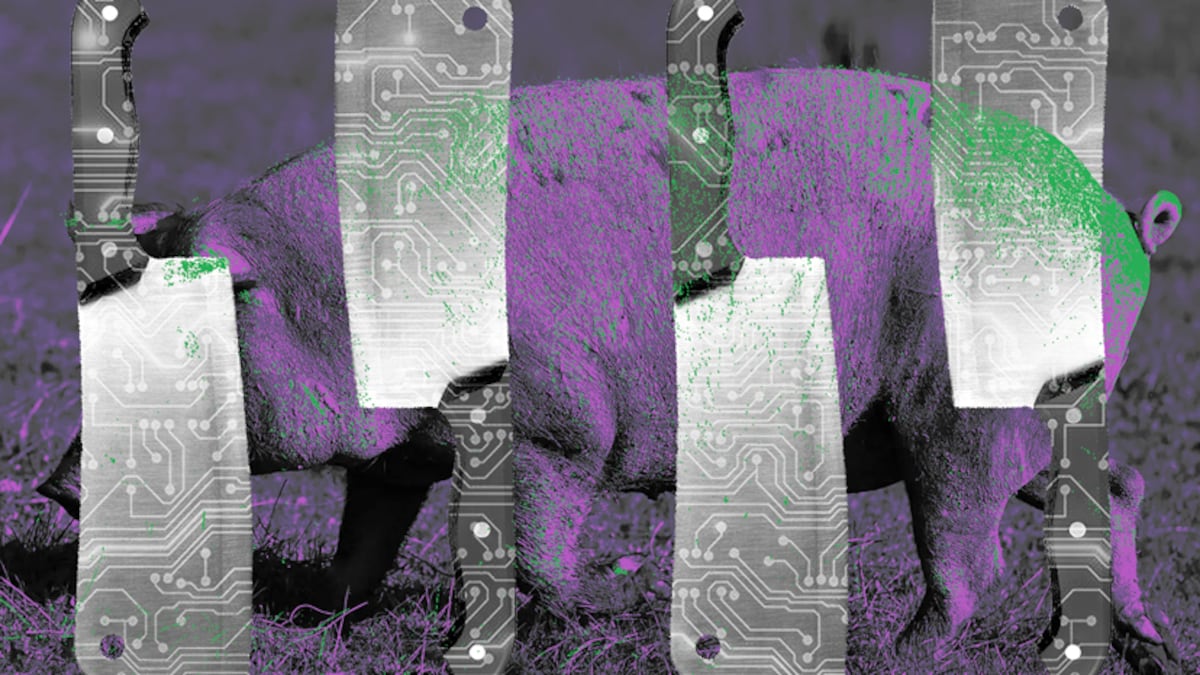- Pig butchering scams haunt the crypto industry.
- While criminals increasingly up the threat, some people are fighting back.
- However, they fight an uphill battle.
- This, and a lot more in this week’s edition of The Guidance.
A version of this story appeared in our The Guidance newsletter. If you want to read this or our other newsletters before your friends do, don’t hesitate to sign up.
Hello! Callan here with a new edition of The Guidance, your guide to global crypto regulation.
In the cryptocurrency world, unscrupulous activities abound — from rug pulls and deceptive over-the-counter trades to pump-and-dump schemes and the collapse of huge, seemingly legitimate firms (cough, FTX). But one form of deception stands out for its emotional toll: the pig butchering scam.
Pig butchering scams are simple but ingenious. Through social media and dating apps, a scammer forms a romantic attachment with a victim over a period of weeks or months, persuades them to invest in a fraudulent website and then drains them of their money.
In June, DL News reporters Osato Avan-Nomayo and Ekin Genç wrote about how one serial crypto scam victim lost millions to a suspected pig butchering scam. The threat is exacerbated by cybercriminals’ ability to evolve and adopt new tools, such as ChatGPT-like solutions, to ensnare more victims.
NOW READ: How hackers turn stolen crypto into cash
A few months ago I had coffee with a woman who I’m going to call “Hannah.” She was duped out of thousands of dollars by a pig butchering scam a few years ago. And it enraged her enough that she dedicated her life to taking them down.
Hannah and her team of around 80 volunteers at the Global Anti-Scam Organisation are working to not only provide information and resources to victims, and persuade law enforcement and politicians to take notice, but also work to shut down pig butchering at the source.
The source of pig butchering is a network of scam compounds spread across Southeast Asia. They’re run by criminal gangs, and not all their workers are there by choice.
Yet there’s a glimmer of hope. People like Hannah strive to change things. Support has poured in from Taiwanese and Filipino politicians, who are raising awareness in their own countries.
And crusaders like Santa Clara prosecutor Erin West in the US are working to recover money for victims. As of June, West told DL News she had retrieved $2.5 million lost in pig butchering scams for victims, and formed a network of over 900 law enforcers to teach them how to do the same. Scammers countered by starting to impersonate her to ensnare new victims.
NOW READ: Top 10 crypto hacks of 2023 — Stake ranks fifth as hackers wipe $735m
In China too, where these scams have existed for years, there’s currently a national discussion about these scam compounds.
The phenomenon even has its own summer blockbuster in China. “No More Bets,” which came out in August and stars former member of boyband EXO Lay Zhang as a computer programmer, made more than 2.6 billion RMB (US$355 million) in its first two weeks.
But when it comes to falling for a pig butchering scam, you probably think it would never happen to you. You’d have to be stupid, right? Prior to being scammed, many victims would likely say the same thing.
Look. It’s important to understand how manipulative these schemes are. Scamming operations even produce guidebooks and scripts for workers to use.
Imagine it. You’ve been talking to someone for months. They seem to really like you. They’re kind and attentive and send you cute little stickers.
Then maybe one day they don’t reply straight away. They message you half an hour later apologising and casually mention they were helping their uncle set up an account. Maybe you ask what sort of account. They say it’s an investment site. They don’t try to persuade you or spam you with info. You’re the one asking the questions. It’s not too weird if they then offer to help you set one up, is it?
We need to keep talking about this — because awareness is the first step in dismantling this insidious operation. Don’t just swipe left on this one. This is an emerging global crisis, and awareness is the first line of defence. Share it, discuss it, do whatever it takes to get the word out.
Read more about Hannah’s story and the work she’s doing here. Plus, read more about what’s going on in Southeast Asia and how these compounds work here.
If you’ve been affected by a pig butchering scam or have any tips, please reach out to me at callan@dlnews.com or on Telegram at @quinnishvili.
DL News also has a TG channel. Check out our News Feed for the latest breaking stories, community polls, and of course— the memes. https://t.me/dlnewsinfo
Post of the week
It’s time to take action. I propose the first-ever U.S. pilot program for digital asset markets as a regulatory sandbox to test, gather data, & examine innovation. This creates a safe framework for new technologies & market structures under existing regulations & protections. https://t.co/K0cUPCXpY3
— Acting Chairman Pham (@CFTCpham) September 8, 2023
CFTC Commissioner Caroline D. Pham told the libertarian think tank the Cato Institute that she had proposed to launch a US pilot programme for digital asset markets to ensure the country did not miss “opportunities to capitalise on all the benefits of the technology before us, while others take a more strategic and long-term view.” The news came as Ripple and other crypto companies have lobbied to influence new bills that would make the CFTC the industry’s main regulator.





